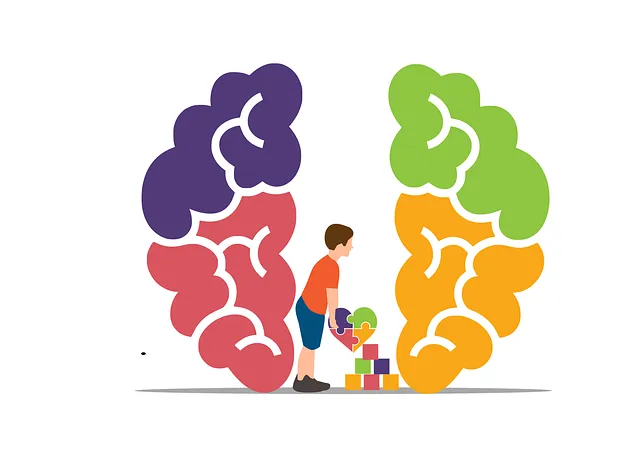Social Skills Training is a holistic component of mental health care offered by Kaiser Permanente in Lone Tree, Colorado. This training goes beyond communication, focusing on emotional intelligence and self-awareness to help individuals confidently navigate social environments. By integrating conflict resolution techniques, participants gain tools to address interpersonal challenges constructively, promoting mental well-being. For those in Kaiser Permanente mental health roles, this training serves as a game-changer, fostering resilience and enhancing quality of life. The program combines role-playing, CBT, and mindfulness meditation to improve social interactions and manage conditions like anxiety and depression. Integrating such training into professional development improves patient care and outcomes for mental health professionals in Lone Tree.
Social skills training is a powerful tool in enhancing mental well-being, especially for those navigating various mental health conditions. This article delves into the significance of such training within mental healthcare, using Kaiser Permanente’s innovative approach in Lone Tree as a case study. We explore common social interaction challenges faced by individuals with mental health issues and present effective strategies for professionals to implement. Additionally, we discuss integrating social skills training into the fabric of mental health professional development, highlighting its potential impact on patient outcomes.
- Understanding the Importance of Social Skills Training in Mental Health Care
- Kaiser Permanente's Approach to Mental Health Support in Lone Tree
- Identifying Target Areas: Common Challenges in Social Interaction for Individuals with Mental Health Conditions
- Strategies and Techniques for Effective Social Skills Training
- Integrating Social Skills Training into Professional Development for Mental Health Professionals
Understanding the Importance of Social Skills Training in Mental Health Care

Social Skills Training plays a pivotal role in the holistic care of individuals managing mental health conditions, especially when considering roles like Kaiser Permanente mental health jobs Lone Tree. Beyond traditional therapeutic interventions, this training empowers individuals to navigate social environments with greater ease and confidence. It’s not just about learning communication strategies; it’s about cultivating emotional intelligence (EI) and self-awareness exercises that are crucial for building meaningful connections and managing relationships effectively.
By integrating Conflict Resolution Techniques into their repertoire, individuals gain valuable tools to address interpersonal challenges constructively. This aspect is particularly significant in promoting mental well-being, as social interactions can either perpetuate or alleviate symptoms of various mental health disorders. Therefore, Social Skills Training becomes a game-changer, fostering resilience and enhancing the overall quality of life for those seeking Kaiser Permanente mental health jobs Lone Tree or similar roles focused on community support.
Kaiser Permanente's Approach to Mental Health Support in Lone Tree

Kaiser Permanente, a leading healthcare provider, offers a comprehensive approach to mental health support in Lone Tree, Colorado. Their strategy involves an integrated model that combines medical care with behavioral health services, ensuring a holistic treatment experience for individuals dealing with various mental health conditions. This inclusive environment fosters better patient outcomes and overall well-being.
The organization focuses on empowering patients through Mental Wellness Coaching Programs, which are designed to enhance self-esteem and equip individuals with effective coping strategies. Additionally, their professional team employs Empathy Building Strategies to create a supportive network, encouraging open communication and understanding among patients and caregivers. By combining these initiatives, Kaiser Permanente aims to revolutionize mental health care in Lone Tree, making it accessible and beneficial for all who seek support.
Identifying Target Areas: Common Challenges in Social Interaction for Individuals with Mental Health Conditions

Individuals with mental health conditions often face unique challenges when it comes to social interactions. These challenges can range from difficulty initiating conversations to struggling with emotional regulation in group settings, which are common barriers to building and maintaining meaningful relationships. For instance, someone with anxiety disorders might experience profound social anxiety, making it hard for them to participate in community activities or even casual gatherings. Similarly, individuals dealing with depression frequently report feeling isolated and may find it exhausting to engage in small talk or maintain eye contact.
In the context of Kaiser Permanente mental health jobs in Lone Tree, identifying these target areas is crucial for tailoring effective training programs. The Community Outreach Program Implementation, for instance, could focus on Mental Illness Stigma Reduction Efforts, teaching participants coping strategies and communication skills to navigate social situations more comfortably. Incorporating practices like Mindfulness Meditation can also empower individuals to stay grounded and present during interactions, helping them build resilience against stressors that may arise in various social settings.
Strategies and Techniques for Effective Social Skills Training

Social Skills Training for Mental Health Conditions at Kaiser Permanente mental health jobs Lone Tree focuses on empowering individuals with effective strategies to navigate social interactions. The program incorporates a variety of techniques, such as role-playing exercises and cognitive behavioral therapy (CBT) methods, to help participants build confidence in social settings. These activities enable them to practice new skills in a safe environment, gradually translating these learnings into real-world applications.
The training emphasizes the importance of understanding and managing emotions during social exchanges, particularly for those seeking Anxiety Relief and supporting Emotional Healing Processes. By focusing on mental wellness, the program equips individuals with tools to foster meaningful connections, enhance communication, and promote positive interactions. Through these comprehensive strategies, participants at Kaiser Permanente mental health jobs Lone Tree can improve their overall quality of life and better manage their mental health conditions.
Integrating Social Skills Training into Professional Development for Mental Health Professionals

Integrating Social Skills Training into professional development is a significant step for mental health professionals in Lone Tree, particularly those employed with Kaiser Permanente mental health jobs. These training programs play a crucial role in enhancing patient care and improving outcomes. By incorporating social skills education, therapists, counselors, and psychiatrists can learn effective communication techniques that foster meaningful connections with their clients. This approach is especially beneficial for addressing conditions like anxiety and depression, where social isolation and communication barriers often contribute to the onset and severity of symptoms.
The inclusion of social skills training within professional development allows mental health professionals in Lone Tree to acquire valuable tools for Stress Reduction Methods and Resilience Building. These workshops equip them with strategies to guide clients through Stress Management Workshops Organization, teaching them how to navigate social situations with confidence and resilience. Ultimately, integrating such training into the fabric of mental health care can lead to more fulfilling professional experiences for providers and improved well-being for their patients.
Social skills training is a valuable asset in the realm of mental health care, especially as organizations like Kaiser Permanente in Lone Tree prioritize holistic support. By focusing on target areas such as communication and social interaction challenges, professionals can employ effective strategies to enhance patient outcomes. Integrating this training into the ongoing professional development of mental health workers ensures a more comprehensive approach to treatment, catering to the diverse needs of individuals seeking care in the competitive job market of Kaiser Permanente mental health jobs in Lone Tree.




